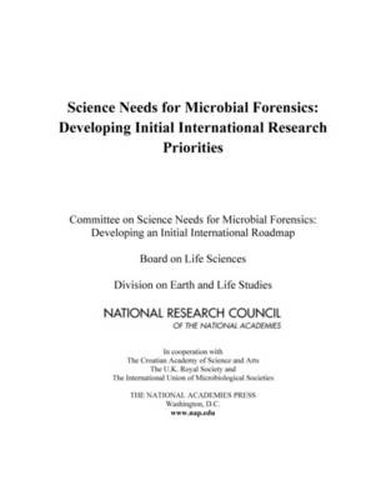Readings Newsletter
Become a Readings Member to make your shopping experience even easier.
Sign in or sign up for free!
You’re not far away from qualifying for FREE standard shipping within Australia
You’ve qualified for FREE standard shipping within Australia
The cart is loading…






Microbial forensics is a scientific discipline dedicated to analyzing evidence from a bioterrorism act, biocrime, or inadvertent microorganism or toxin release for attribution purposes. This emerging discipline seeks to offer investigators the tools and techniques to support efforts to identify the source of a biological threat agent and attribute a biothreat act to a particular person or group. Microbial forensics is still in the early stages of development and faces substantial scientific challenges to continue to build capacity.
The unlawful use of biological agents poses substantial dangers to individuals, public health, the environment, the economies of nations, and global peace. It also is likely that scientific, political, and media-based controversy will surround any investigation of the alleged use of a biological agent, and can be expected to affect significantly the role that scientific information or evidence can play. For these reasons, building awareness of and capacity in microbial forensics can assist in our understanding of what may have occurred during a biothreat event, and international collaborations that engage the broader scientific and policy-making communities are likely to strengthen our microbial forensics capabilities. One goal would be to create a shared technical understanding of the possibilities - and limitations - of the scientific bases for microbial forensics analysis.
Science Needs for Microbial Forensics: Developing Initial International Research Priorities, based partly on a workshop held in Zabgreb, Croatia in 2013, identifies scientific needs that must be addressed to improve the capabilities of microbial forensics to investigate infectious disease outbreaks and provide evidence of sufficient quality to support legal proceedings and the development of government policies. This report discusses issues of sampling, validation, data sharing, reference collection, research priorities, global disease monitoring, and training and education to promote international collaboration and further advance the field.
$9.00 standard shipping within Australia
FREE standard shipping within Australia for orders over $100.00
Express & International shipping calculated at checkout
Microbial forensics is a scientific discipline dedicated to analyzing evidence from a bioterrorism act, biocrime, or inadvertent microorganism or toxin release for attribution purposes. This emerging discipline seeks to offer investigators the tools and techniques to support efforts to identify the source of a biological threat agent and attribute a biothreat act to a particular person or group. Microbial forensics is still in the early stages of development and faces substantial scientific challenges to continue to build capacity.
The unlawful use of biological agents poses substantial dangers to individuals, public health, the environment, the economies of nations, and global peace. It also is likely that scientific, political, and media-based controversy will surround any investigation of the alleged use of a biological agent, and can be expected to affect significantly the role that scientific information or evidence can play. For these reasons, building awareness of and capacity in microbial forensics can assist in our understanding of what may have occurred during a biothreat event, and international collaborations that engage the broader scientific and policy-making communities are likely to strengthen our microbial forensics capabilities. One goal would be to create a shared technical understanding of the possibilities - and limitations - of the scientific bases for microbial forensics analysis.
Science Needs for Microbial Forensics: Developing Initial International Research Priorities, based partly on a workshop held in Zabgreb, Croatia in 2013, identifies scientific needs that must be addressed to improve the capabilities of microbial forensics to investigate infectious disease outbreaks and provide evidence of sufficient quality to support legal proceedings and the development of government policies. This report discusses issues of sampling, validation, data sharing, reference collection, research priorities, global disease monitoring, and training and education to promote international collaboration and further advance the field.